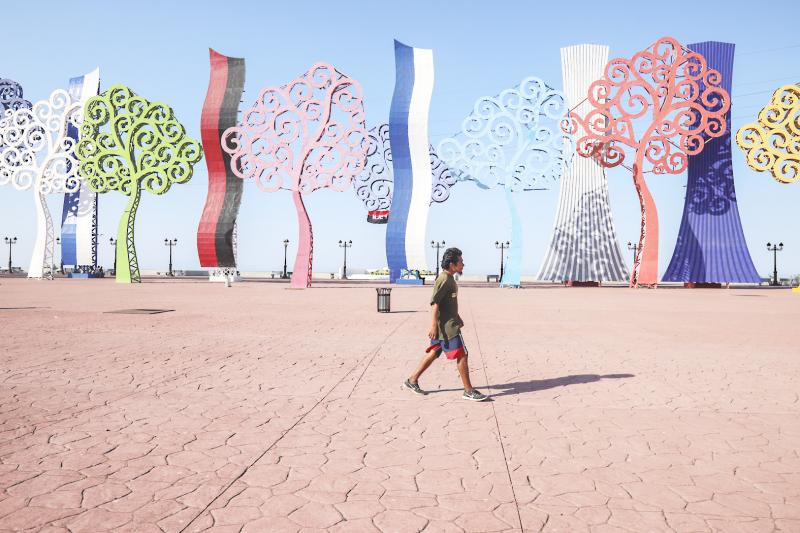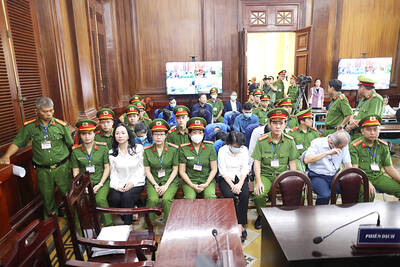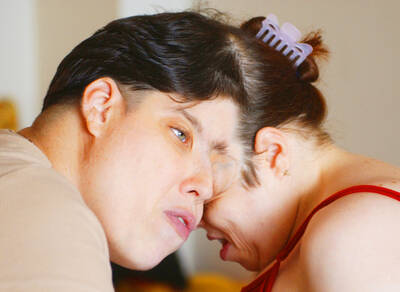International health officials are warning that the Nicaraguan government’s perplexing weeks-long refusal to take measures to control the spread of COVID-19 is heightening the risk of an epidemic in Central America even as neighboring countries take tough action.
Nicaraguan President Daniel Ortega’s government urged Nicaraguans to party during Carnival celebrations, and it has said they should keep attending sports events and cultural festivals, and pack the country’s beaches during Holy Week vacations this week.
Doctors have been told not to alarm patients by wearing masks or using sanitizing gel.

Photo: AP
Before schools closed for an extended vacation on Friday last week, principals had threatened to expel students who missed class, and last month a third baseman was banned from professional baseball for three years after he asked to stop playing over virus fears.
Ortega’s administration has offered no detailed explanation for its refusal to take widely accepted measures, but the health minister has spoken of the need to support the economy, badly damaged by two years of anti-government protests and harsh crackdowns on dissent.
Some analysts say Ortega and his circle might fear that anti-virus measures would weaken their hold on power.
In the meantime, Nicaraguans are doing what they can to voluntarily stay away from one another, but Pan American Health Organization Director Carissa Etienne said that Nicaragua’s lack of official measures is increasing the risk of an epidemic.
“We have concerns for the lack of social distancing, the convening of mass gatherings. We have concerns about the testing, contact tracing, about the reporting of cases,” Etienne said on Tuesday.
Costa Rican President Carlos Alvarado has warned that an out-of-control epidemic in Nicaragua would have consequences for all of Central America. In the middle of last month, Costa Rica, El Salvador and Honduras closed their borders to foreigners and instituted social distancing measures.
There are also concerns about Ortega’s own health. The 74-year-old has not appeared in public for three weeks. Although he has been absent for long periods in the past only to reappear, his disappearance during a global pandemic is fueling rumors he might be ill, or personally terrified of the coronavirus.
“The broader problem in Nicaragua is that you have a dictatorship that is unable to take the pandemic seriously. It’s unable because they’re distracted by the health itself of its president,” said Manuel Orozco, a Nicaragua expert at the Inter-American Dialogue in Washington.
The country’s economic crisis — and resulting lack of revenue — also means the state’s ability to act is very limited, he said.
As a guerrilla commander, Ortega in 1979 helped overthrow then-Nicaraguan president Anastasio Somoza and was part of the Sandinista junta that took power and began to take the nation down a path toward communism.
He was first elected president in 1984, then lost re-election in 1990, but he has held the presidency since 2006 and implemented increasingly autocratic rule. His wife, Rosario Murillo, has served as the government’s principal spokeswoman and, since 2016, as Nicaraguan vice president.
Ortega’s violent crackdown on protests, which began in 2018, caused more than 328 deaths, the Inter-American Commission on Human Rights said. The political tension has had devastating effects on the country’s economy, especially in what had been a burgeoning tourism sector.
The government says that the country has only three confirmed cases of the virus, all imported, even as its borders remain open and infections steadily increase in neighboring countries.
Costa Rica has more than 400 confirmed infections, Honduras has more than 300 and El Salvador about 100. The Cuban Ministry of Public Health has said that two people arrived sick from Nicaragua and a third person tested positive this week after returning from Nicaragua.
“Nothing indicates that the problem that Spain, Italy and the United States have won’t repeat itself in Nicaragua, too,” epidemiologist Leonel Arguello said.
While the virus initially emerged in China during the winter and there is some suggestion that it might not spread as easily when both the temperature and humidity increase, scientists have said there is no good evidence yet that such weather — common in Central America — will significantly help tamp down the outbreak on its own.

Republican US lawmakers on Friday criticized US President Joe Biden’s administration after sanctioned Chinese telecoms equipment giant Huawei unveiled a laptop this week powered by an Intel artificial intelligence (AI) chip. The US placed Huawei on a trade restriction list in 2019 for contravening Iran sanctions, part of a broader effort to hobble Beijing’s technological advances. Placement on the list means the company’s suppliers have to seek a special, difficult-to-obtain license before shipping to it. One such license, issued by then-US president Donald Trump’s administration, has allowed Intel to ship central processors to Huawei for use in laptops since 2020. China hardliners

A top Vietnamese property tycoon was on Thursday sentenced to death in one of the biggest corruption cases in history, with an estimated US$27 billion in damages. A panel of three hand-picked jurors and two judges rejected all defense arguments by Truong My Lan, chair of major developer Van Thinh Phat, who was found guilty of swindling cash from Saigon Commercial Bank (SCB) over a decade. “The defendant’s actions ... eroded people’s trust in the leadership of the [Communist] Party and state,” read the verdict at the trial in Ho Chi Minh City. After the five-week trial, 85 others were also sentenced on

Conjoined twins Lori and George Schappell, who pursued separate careers, interests and relationships during lives that defied medical expectations, died this month in Pennsylvania, funeral home officials said. They were 62. The twins, listed by Guinness World Records as the oldest living conjoined twins, died on April 7 at the Hospital of the University of Pennsylvania, obituaries posted by Leibensperger Funeral Homes of Hamburg said. The cause of death was not detailed. “When we were born, the doctors didn’t think we’d make 30, but we proved them wrong,” Lori said in an interview when they turned 50, the Philadelphia Inquirer reported. The

RAMPAGE: A Palestinian man was left dead after dozens of Israeli settlers searching for a missing 14-year-old boy stormed a village in the Israeli-occupied West Bank US President Joe Biden on Friday said he expected Iran to attack Israel “sooner, rather than later” and warned Tehran not to proceed. Asked by reporters about his message to Iran, Biden simply said: “Don’t,” underscoring Washington’s commitment to defend Israel. “We are devoted to the defense of Israel. We will support Israel. We will help defend Israel and Iran will not succeed,” he said. Biden said he would not divulge secure information, but said his expectation was that an attack could come “sooner, rather than later.” Israel braced on Friday for an attack by Iran or its proxies as warnings grew of